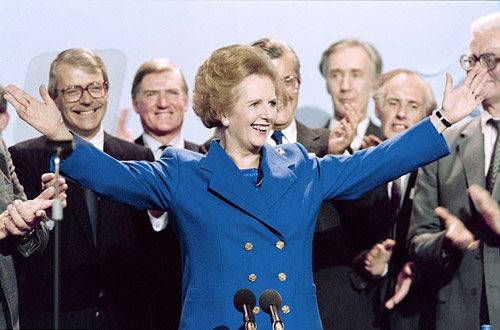理直气壮大嗓门 权力越大声音越响亮(双语)
You may have noticed that the voices of politicians seem to change as they rise up the ranks.
你可能会注意到,政客升往高职时,他们的声音也随之改变。
Now scientists claim that being in a position of power can fundamentally change the way you speak and other people can pick up on these vocal cues。
科学家研究发现,位高权重会从根本上改变你的说话方式,而其他人能注意到这种语言暗示。
They say that the cues - such as talking more loudly with less variation in pitch - tell people who is really in charge, regardless of what an individual is saying。
科学家认为,声音嘹亮、音调平缓的说话方式,能告诉别人谁是这个团体的当权者,而不在乎别人怎么想。
‘Our findings suggest that whether it's parents attempting to assert authority over unruly children, haggling between a car salesman and customer, or negotiations between heads of states, the sound of the voices involved may profoundly determine the outcome of those interactions,’ psychological scientist Sei Jin Ko of San Diego State University said。
圣地亚哥州立大学(San Diego State University)的心理学家柯谢金(Sei Jin Ko)指出:“研究表明,不管是父母想在任性的小孩面前树立威信,还是汽车销售员与顾客讨价还价,抑或是各国元首进行会谈,他们的说话方式都会对这些互动造成深远影响。
Dr Ko and her team had long been interested in non-language-related properties of speech, but it was former UK Prime Minister Margaret Thatcher that inspired them to investigate the relationship between acoustic cues and power。
柯博士的团队一直对演讲中的的非语言方面很有兴趣,但前英国首相撒切尔夫人的经历激发了他们好奇心,让他们想要研究声信号与权力的关系。
 撒切尔夫人
撒切尔夫人
‘It was quite well known that Thatcher had gone through extensive voice coaching to exude a more authoritative, powerful persona,’ she explained。
柯博士解释道:“众所周知,撒切尔夫人曾受过大量的语音训练,以便显得更具权威、更强势。”
‘We wanted to explore how something so fundamental as power might elicit changes in the way a voice sounds, and how these situational vocal changes impact the way listeners perceive and behave toward the speakers.’
“因此,我们想要探究权力这类东西,是如何让声音发生变化的;还有不同场合的声音变化,会如何在观念和行动上影响听众。
To find out, Dr Ko, Melody Sadler, also of San Diego State and Adam Galinsky of Columbia Business School, designed two studies。
为了找出答案,柯博士与同事梅洛迪·萨德勒(Melody Sadler),以及哥伦比亚商学院[微博]的亚当·加林斯基(Adam Galinsky)设计了两个实验。
In the first experiment, they recorded 161 college students reading a passage so they could record their natural acoustics。
在第一个实验中,他们请来161名大学生朗读文章,然后录下他们的声音。
The participants were then randomly assigned to play a specific role in a negotiation exercise, according to the study, published in the journal Psychological Science。
然后这些学生被随机分组,在谈判练习中扮演特定的角色。该研究成果被发表在《心理科学》期刊上。
Students assigned to a ‘high rank’ were told to go into the negotiation imagining that they either had a strong alternative offer, valuable inside information, or high status in the workplace. Alternatively, they were also asked to recall an experience in which they had power before the negotiation started。
在模拟谈判时,被分配到“高层”的学生要想象他们有强大的实力、珍贵的内部信息和较高的工作地位。此外,研究者也要求他们在谈判前,回想自己曾经拥有权力的经历。
Low-rank students, on the other hand, were told to imagine they had either a weak offer, no inside information, or low workplace status, or they were asked to recall an experience in which they lacked power。
另一方面,“底层”的学生则要想象他们处于劣势地位,并回想自己没有权力的时候。
 希拉里·克林顿
希拉里·克林顿
The students then read a second passage aloud in character, as if they were negotiating with an imaginary adversary and their voices were recorded。
然后,学生们以各自的身份大声朗读第二段文章,就像他们在与想象中的对手谈判一样,与此同时,研究者录下他们的声音。
All the students involved in the experiment read the same opening, which allowed the researchers to examine acoustics fairly, because the contents of the passage remained the same。
因为所有的学生都朗读了相同的段落和的内容,所以研究者能公正地检验声音效果。
Comparing the first and second recordings, the researchers found that the voices of students assigned to high-power roles tended to go up in pitch, as well as become more monotone - with less variable in pitch – and varied more in volume than the voices of students assigned low-power roles。
比对第一段与第二段录音,研究者们发现:被分配到“高层”的学生,声音高亢、音调平缓,而且音量也比“底层”角色的学生大。
‘Amazingly, power affected our participants' voices in almost the exact same way that Thatcher's voice changed after her vocal training,’ said Professor Galinsky。
贾林斯基说:“令人惊奇的是,测试者受权力影响后的声音变化,几乎与撒切尔夫人受语音训练后的声音变化一模一样。”
While Baroness Thatcher's voice got deeper overall thanks to voice coaching, the researchers told MailOnline that it got higher pitched in 'power situations'。
研究人员向《每日邮报》表示,撒切尔夫人通过语音训练,虽然声音整体上有很大改变,但在“权力场合”中,她会用更高的音调演讲。
'That is different from a voice being generally high or low pitched,' they explained,'Or to put it another way, even if speaker A's voice is generally lower pitched than speaker B's voice, both speakers can increase their pitch to the same degree in a high power situation.'
他们解释说:“这与一般人平时说话的音调高低不同。换句话说,即使A说话的音调本身就低于B,但在需要权力的场合中,两人的音调都会有相同程度的提高。
And the students' vocal cues didn't go unnoticed。
此外,学生声音的变化也能引起听众的注意。
A second experiment with a separate group of college students revealed that listeners, who had no knowledge of the first experiment, were able to pick up on these power-related vocal cues to determine who did and did not have power。
第二个实验邀请了另一群大学生,他们并不清楚之前的实验,但也能通过发言者不同的说话方式,确定其有权或无权。
Listeners ranked speakers who had been assigned to the high-rank group as more likely to engage in high-power behaviours and they were able to spot whether a speaker held a position of power or not, with ‘considerable accuracy’。
听众会把发言者分配到不同组别,被分到“高层”组的往往是之前扮演有权力的人,而且听众能“相当准确”地发现发言者是否拥有权力。
Echoing the findings of the first experiment, listeners tended to associate higher pitch and voices that varied in volume, with powerful people. They also associated louder voices with higher power。
这也印证了第一个实验的结果,听众倾向于把嗓音高亢及声音嘹亮的发言者,视为拥有更高权力的人。
‘These findings suggest that listeners are quite perceptive to these subtle variations in vocal cues and they use these cues to decide who is in charge,’ Professor Galinsky said。
贾林斯基教授说:“这些发现指出,听众相当了解声音暗示的微妙变化,并用这些暗示来判断谁是当权者。”


